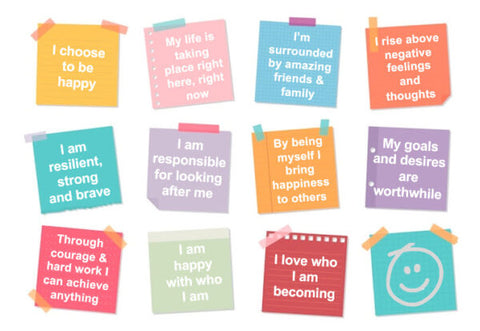Ever heard the saying, "You are what you think"? Well, it's not just some whimsical phrase your yoga instructor throws around. It's rooted in the science of how our brain works. Every thought we have, especially the repetitive ones, can shape our neural pathways, influencing our behavior, emotions, and ultimately, our reality. Enter affirmations.
The idea that saying a few positive, empowering statements can magically improve your life might sound a little far-fetched. While that's not exactly how affirmations work, they can definitely be effective, especially when you know how to use them.
Affirmations, when done right, can be powerful allies in your journey to a life of abundance. They help you reshape your thoughts, which in turn, influence your actions. But remember, they're not a substitute for effort. They're a catalyst. So, the next time you're chanting your affirmations, ask yourself: "Am I just saying it, or am I living it?" Because, dear reader, affirmations are the magic words that only work when you do.
Why affirmations work
Researchers have found that our brains are actually wired with a negativity bias that serves as a survival strategy to identify threats. Since we typically no longer need to be in survival mode all day, using affirmations, we can combat this negativity bias and rewire our brain toward more helpful thought patterns.
It’s about really identifying, in really concrete ways, the kinds of things about you that you really value. This is about accurately and authentically encouraging yourself or using words of encouragement or acknowledgment that are consistent with your truth.
Our brains are always looking for shortcuts and tend to latch onto thoughts that come up the most or are the most easily accessible. At times, it’s easier to let negative thoughts like “I’m not qualified enough for this job,” circulate in your mind and to interpret those thoughts as fact. A more positive go-to statement at the front of your mind can help counter those thoughts.
The problem with negative thoughts is that they can become self-fulfilling prophecies. We talk ourselves into believing that we're not good enough. And, as a result, these thoughts drag down our personal lives, our relationships, and our careers.
But, if we deliberately do the opposite and use positive thoughts about ourselves, the effect can be just as powerful but far more helpful.
You’ve probably affirmed yourself without even realizing it by telling yourself things like:
“I can do this.”
“I’ve got what it takes.”
“I believe I can succeed.”
These simple statements help shift your focus away from perceived failures or inadequacies and direct your focus toward your strengths — those you already have and those you want to develop.
But do they actually work?
Neuroplasticity, or your brain’s ability to change and adapt to different circumstances throughout your life, offers a clue to help understand not only what makes affirmations work, but how to make them more effective.
Your brain sometimes gets a little mixed up on the difference between reality and imagination, which can be surprisingly useful.
Creating a mental image of yourself doing something — like acing a nerve-wracking interview or conquering your fear of heights by bungee jumping — activates many of the same brain areas that actually experiencing these situations would.
Regular repetition of affirming statements about yourself can encourage your brain to take these positive affirmations as fact. When you truly believe you can do something, your actions often follow. And the more you work with your affirmation, the more the positive thinking can aid in self-improvement, as they help to transform negative thought loops and patterns.

Why Affirmations Need Your Effort:
But here's the catch - they're not some magical incantation. They only work when you do. Shocking, right?
Here's where most folks get it wrong. They think affirmations are like ordering from a cosmic drive-thru. Say it, and it'll come. But the universe isn't flipping burgers here. Affirmations are tools, not magic wands. They help rewire your brain, but you still need to put in the work. It's like having a gym membership. Owning one doesn't get you fit; using it does.
Remember, action is key. If you tell yourself that you treat your body with love and care but don't spend time moving your body or nourishing yourself with healthy food, your affirmations will lose their effectiveness.
How to use affirmations
Affirmations are a promising way to go about reconstructing limiting beliefs because they only require your attention and awareness to get started. Getting into the habit of simply saying your affirmations out loud, thinking them in your head, or writing them down somewhere you'll see them often, will slowly but surely start changing the way you feel from the inside out.On top of that, try visualizing or feeling whatever you're affirming as you say it—what does it sound like? Look like? Feel like? These simple practices change the affirmation from a cognitive exercise to one that also incorporates your heart and body.









